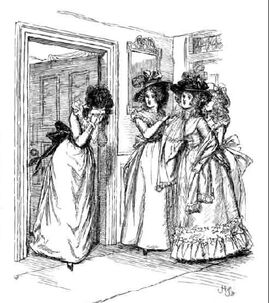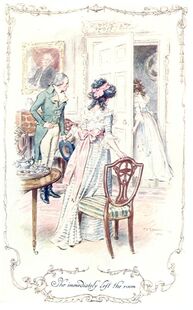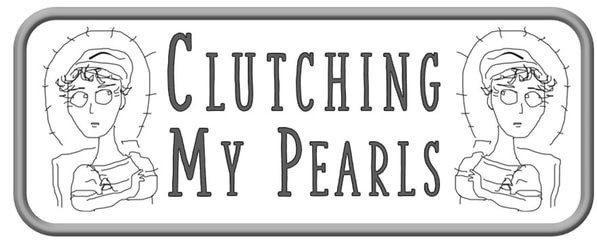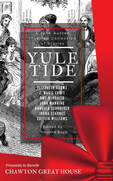| Clutching My Pearls is about Jane Austen and the times she lived in. The opinions are mine, but I don't claim originality. Much has been written about Austen. Click here for the first in the series. |
 Marianne heartbroken over Willoughby
Marianne heartbroken over Willoughby Big sister Elinor wants Marianne “to treat our acquaintance in general with greater attention.” Evidently she’s brought this failing up often enough so that Edward Ferrars is aware of it, after having lived with the family for a few weeks back at Norland. During his later visit to Barton Cottage, he teases, "'You have not been able to bring your sister over to your plan of general civility. Do you gain no ground?'
'Quite the contrary,' replied Elinor, looking expressively at Marianne."
Marianne falls in love with the dashing Willoughby and is heartbroken when he leaves. She has no patience for company, and gives offense by turning down Lady Middleton’s offer of a card game: “Marianne... with her usual inattention to the forms of general civility, exclaimed, 'Your Ladyship will have the goodness to excuse ME—you know I detest cards. I shall go to the piano-forte..."
Elinor catches Lady Middleton’s reaction, and tries to smooth things over with a compliment...
Marianne is being honest and Elinor is possibly exaggerating and saying what she says merely to placate her hostess, but in Austen's moral universe, Elinor is the better person.
 Marianne avoids company, especially Colonel Brandon
Marianne avoids company, especially Colonel Brandon When the faithless Willoughby breaks Marianne’s heart. She wants to go home instantly – “tomorrow.”
"To-morrow, Marianne!" [Elinor exclaims] "It would be impossible to go to-morrow. We owe Mrs. Jennings much more than civility; and civility of the commonest kind must prevent such a hasty removal as that."
Grief-stricken Marianne even accuses others of incivility. She complains of Mrs. Jennings: "Her kindness is not sympathy… All that she wants is gossip, and she only likes me now because I supply it.” And when Colonel Brandon visits, she snaps, “A man who has nothing to do with his own time has no conscience in his intrusion on that of others."
Sometimes the ”post of civility” is an exertion, and Austen doesn’t pretend otherwise. It's even referred to as something you "pay" in Emma, when Emma inwardly groans at the burden of being nice to Jane Fairfax: "She was sorry to have to pay civilities to a person she did not like! - to be always doing more than she wished, and less than she ought!"
Austen herself, from what we can gather, devoted many a tedious hour to chatting with people, especially during her residence in Bath, when she would have preferred to be doing almost anything else. Her compensation was making catty remarks in her letters to Cassandra: "Wednesday. -- Another stupid party last night; perhaps if larger they might be less intolerable, but here there were only just enough to make one card-table, with six people to look on and talk nonsense to each other."
Austen doesn’t insist upon smiling, gracious behaviour to everyone and in all circumstances. Elinor speaks sternly and bluntly to Willoughby when talking over his treatment of Marianne and Eliza. Sometimes Elinor says nothing, as when Edward's brother Robert did not deserve “the compliment of rational opposition.” And then there is her little dig at Lady Middleton’s children, "I confess that while I am at Barton Park, I never think of tame and quiet children with any abhorrence."
 Anthony Ashley-Cooper, 3rd Earl of Shaftesbury (1671 - 1713)
Anthony Ashley-Cooper, 3rd Earl of Shaftesbury (1671 - 1713) Professor Cohen sees the questions of civility and good manners in Austen as being more than skin deep, more than superficial. Good manners are a reflection of our inner character. Cohen thinks our own “longing for civility in an age of coarseness and meanness” is “central to [Austen’s] popularity."
Austen's belief in the moral importance of civility probably owes something to Lord Shaftesbury. Austen might never have read Shaftesbury's works, but his ideas were diffused in the culture, just as we know about Darwin’s theory of evolution without actually reading his books. Shaftesbury argued that people did not always act out of self-interest, that we are born with an instinct for benevolence -- doing good for others brings us pleasure. He saw civility as more than a mere gloss on behaviour, though he uses the analogy of a polished stone to describe how civility works to improve human interaction in society:
"We polish one another, and rub off our Corners and rough Sides by a sort of amicable Collision. To restrain this, is inevitably to bring a Rust upon Men’s Understanding. ‘Tis a destroying of Civility, Good Breeding, and even Charity itself…”
Historian Christine Zabel explains: “For Shaftesbury, it is clear, politeness was a concept that went far beyond mere rules of good conversation or behavior… politeness was directly linked to political liberty” and freedom of speech. Civility was a mark of civilized society.
But not all academics today take such a positive view of civility, or its effect on society.
| In my short story "By A Lady," Elizabeth and Darcy have been happily married for several years. They are invited to Rosings by Lady Catherine de Bourgh and Elizabeth is determined to make amends to Anne de Bourgh, who she feels she slighted in the past. "“My conscience does not reproach me on the score of what I did,” [Elizabeth tells Darcy], “but of what I thought. I was uncharitable. I was unkind... I derived more pleasure from disliking her and building on my prejudice than in trying to draw her out. I could easily have made the attempt. Instead I told myself she was stupid, dull, and haughty.” "By A Lady" is part of the Yuletide anthology and makes a great Christmas gift for the Janeite on your list. Proceeds from the e-book and paperback go to Chawton House, the Center for Early Women Writers. |


 RSS Feed
RSS Feed